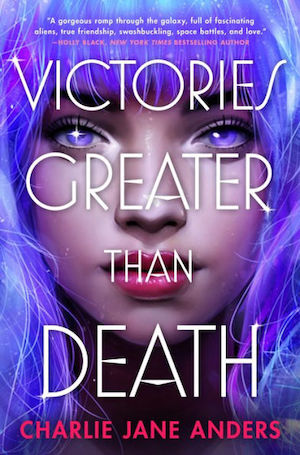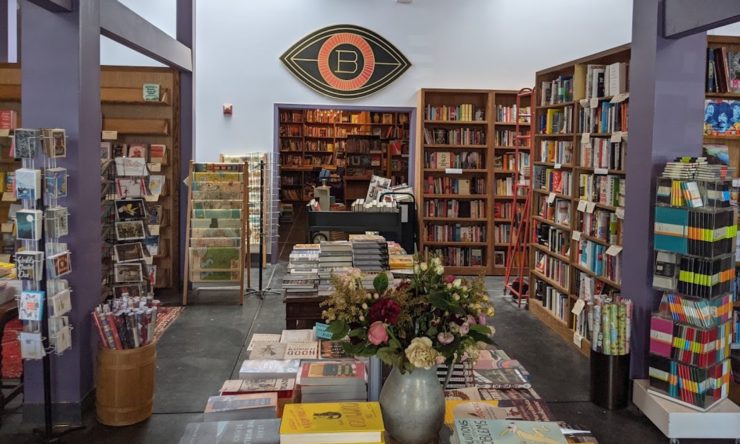Like many other booksellers, Margaret (not her real name) was forced to shut down her store a year ago. When she reopened, she mostly sold books online, allowing customers to come by and pick them up. But when the number of new covid-19 cases in her area started to decline, she decided to let in one household at a time for in-store browsing—and within two weeks, she had contracted covid-19.
This past year has been an unprecedented challenge for physical bookstores, which have had to find ways to keep their relationship with their communities alive during social distancing and lockdowns. It’s a heartbreaking paradox: more people than ever have been reading, and publishers reported record profits in 2020, but bookstores have struggled to make ends meet. To survive, owners and staff have had to come up with new answers to the old question: What makes a great bookstore? But also: when things that seemed central to the bookselling experience, like browsing and hand-selling, become impossible, what’s left?
I talked to a dozen local booksellers about what they’ve learned from a year of covid-19, and the lessons range from inspiring to dispiriting. Customers have reaffirmed their love for the shops that nurture their love of reading, and it’s become clearer that bookstores are an irreplaceable part of local communities and neighborhoods. But also, bookstores are retail establishments like any others—fraught with rude and maskless customers, supply-chain problems, and huge morale problems for customer-facing staff.
“It’s been hard to see just how many regular customers from before the pandemic come in with no mask,” says a bookseller named Ray (not their real name). “It makes it real that they didn’t really care about us.” They’ve gotten tired of coping with angry customers who have to wait outside when the store has reached its reduced capacity, and endless arguments about masks. They’re always painfully aware that they’re in an open-carry state.
The bookstores that have endured during this tough time have had to turn to e-commerce—or to push their existing online storefronts more than in the past. (Some also chose to rely on Bookshop.org, which gives a portion of profits from online sales to the bookstore of your choice. Some bookstores also received PPP loans, or raised funds via GoFundMe.) Many customers weren’t used to thinking of a brick-and-mortar bookstore as a place for online shopping at first. But many booksellers told me they’ve been amazed at how much their communities have stepped up to support them.
Greenlight Bookstore in Brooklyn, NY saw its e-commerce sales rise 500 percent in the past year, and online sales now account for 41 percent of the store’s total sales, says co-owner Jessica Stockton Bagnulo. A lot of the store’s employees now spend their time processing online orders, which are a combination of shipping and curbside pickup. Lexi Beach, co-owner of Astoria Bookshop in Queens, NY, says she was surprised at “how many of our regular customers didn’t know that they could place orders through our website.”
“We’ve always had a website, but it went from accounting for a very small portion of our sales to being the bulk of our business,” says Red Durkin, a bookseller at Pegasus Books in Berkeley. The irony of a brick-and-mortar bookstore being saved by the internet is not lost on Durkin, who misses the days when she obsessed about creating a nice space to browse in. “All of those years of [in-person] goodwill-building have paid off” with online orders, she adds.
“When the lockdown started, we had never even contemplated delivering books. But when we started to do so, it was a big hit. There was one day I delivered to 73 different customers,” says Paul Swydan, owner of Silver Unicorn Books in Acton, MA.
Buy the Book


Victories Greater Than Death
Last summer, I talked to one San Francisco bookseller whose website couldn’t process book orders yet—customers needed to call or email to order books. He confided in me that even though this probably resulted in fewer sales, he was still glad, because he wanted to have personal interactions with every customer, no matter what.
To keep that personal touch alive, stores are focusing on another crucial piece: book recommendations. Folio Books in San Francisco has over a hundred curated booklists on its website, and manager Martha Pettit says she loves writing “long recommendation emails based on customer preferences.” They’ve also hosted a virtual book fair, and signings with local authors.
Ally Scott, a writer who works at a Barnes &Noble in McLean, VA, says her store has moved to showcasing more personalized shelf-talkers, with a separate icon for each bookseller. (Hers is a rainbow.) This keeps “the personal touches alive, when interpersonal connection gets so rough.” The store also created a new mascot, a red cartoon creature with a tiny surgical mask named Ruckus, to feature alongside book recommendations on social media.
Meanwhile, Tubby & Coo’s Bookstore in New Orleans has started hosting virtual events, and has been able to reach readers who can’t, or don’t, leave home—as well as people living all over the world. Given that Tubby & Coos’ focus on science fiction and fantasy, “I should have known that most of my customers are introverts, who actually prefer to watch events from home,” says owner Candice Huber.
“I’ve learned there is no limit to the loyalty people feel towards their local bookstore,” says Rebecca George, co-owner of Volumes Bookstore and Cafe in Chicago, IL. “It’s an endless love. They’ll adapt just as fast as you do, and visa versa.”
This article was originally published at Happy Dancing, Charlie Jane Anders’ newsletter, available on Buttondown.
Charlie Jane Anders is the author of Victories Greater Than Death, the first book in a new young-adult trilogy just published in April 2021, along with the forthcoming short story collection Even Greater Mistakes. Her other books include The City in the Middle of the Night and All the Birds in the Sky. Her fiction and journalism have appeared in The New York Times, the Washington Post, Slate, McSweeney’s, Mother Jones, the Boston Review, Tor.com, Tin House, Teen Vogue, Conjunctions,Wired Magazine, and other places. Her TED Talk, “Go Ahead, Dream About the Future” got 700,000 views in its first week. With Annalee Newitz, she co-hosts the podcast Our Opinions Are Correct.











Powell’s in Portland OR has always been one of my favorite independent book stores. Since moving away from the area years ago, I would make a pilgrimage to Powell’s every time I returned to visit family. I discovered their web site a number of years ago. I have watched as Powell’s adapted to COVID restrictions and it appears that because of their strong on-line presence, they have weathered the storm, unlike my other favorite local book store, the Book Worm :-(. While Amazon may have convenience and pricing, my connection with Powell’s leads me to often be willing to pay more to support them. I suppose that is the crux of the matter. If we want the local stores with the personal touch, we must be willing to support them.
Good essay. I adore bookstores. If I keep a wish list with Amazon, I do so to organize my future buys with somewhere like Book Moon in Easthampton.
I will say that not all publishers saw record profits. I think the pandemic really hurt small presses. I only know numbers from Lethe and other small press peers I speak to, but some of us rely on brick-and-mortar stores for our business (and a lack of foot traffic means less people have a chance to discover your book). And personal finances for many readers were in doubt. Our spring 2020 was the worst in a decade, and only now do we see hope and good sales.
I’ve also heard that small presses had a bad year.
I guess I’m an outlier because I mostly discover small presses on Kickstarter, not through bookstore browsing. I definitely bought a lot of books in 2020 though.
COVID or not, bookstores need the same thing as most other retail companies in today’s day and age: a reason for someone to come to your store in lieu of ordering the item online and getting it in 1 or 2 days. So whether it is a coffee bar, a quiet ambiance to read, or great staff who know their books, they need a hook.
Our local bookstore died. :(
Covid just accelerated Amazon’s march to world dominance. Bookstores had been disappearing from Seattle, one of the most literate cities in the U.S., for a decade before the pandemic.
I grew up in a small town and we had a surprisingly (I am now very aware as an adult) decently funded library and even if not, as a young 10 year old reader with, I was told, a high school reading level, so many unknown
w̶o̶r̶l̶d̶s̶books were open to me that it didn’t matter. What my small town definitely lacked was a small (or any sized) bookstore. So, while I do have a certain fondness for bookstores, but they were chains at the start, because when I stepped into one it was as a 14 year old seeking out the current gay content that my small town library didn’t own or wouldn’t have led me read, like Dancer From The Dance, or even something awful (even at that age, I knew them to be trashy books) like any of the Gordon Merrick novels. And in the state I grew up (still red to this day), very few if any bookstores that I would have been able to visit would have carried the books I was willing to spend what little spare cash I had in those days.But once I got to school and post, living as an adult, I rarely spent the little bit of leisure dollars I had at bookstores, but heavily visited then (and still to this day) visit libraries.Yes, bookstores are great places to browse, I do like doing that, and when I was traveling (which I did way more so as a younger guy), I definitely have a lot of fond recollections, for example, for visiting the used bookstore in Provincetown to pick up beach reading materials and books for the evenings, since it would have been ridiculous to pack that kind of stuff for a two week vacation, and e-readers much less tablet’s or phones weren’t a thing in those days. Even now, when I do travel, I still enjoy the pleasure of a physical book but I limit my purchases for one for the trip there and one of the trip back.
I live today in a huge metropolis, one of the largest urban areas on the North American continent, and we have almost the equivalent number of bookstores per person as I had in my state when I was that ten year old boy, and I think the last time I visited a local bookstore probably more than a decade ago and it was to use a gift card I had been given. Oh, but BTW – you couldn’t pay me to shop at Amazon, even for toilet paper.